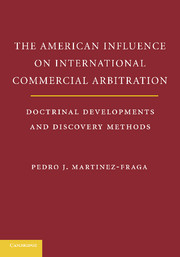 The American Influences on International Commercial Arbitration
The American Influences on International Commercial Arbitration Book contents
- Frontmatter
- Contents
- Table of Citations
- Acknowledgments
- Foreword
- Preface
- 1 Introduction
- 2 The Formation and Transformation of the Status of International and Domestic Arbitration in the United States
- 3 Wilko v. Swan, Scherk v. Alberto-Culver, and Mitsubishi v. Soler: Crafting a Level Playing Field
- 4 Procedural Change and 28 U.S.C. §1782: The Taking of Evidence v. Common Law Discovery
- 5 The Gathering of Evidence v. Common Law Discovery
- 6 What Has Really Happened? The Effects of a Trilogy Examined
- 7 The New Unorthodox Conception of Common Law Discovery in International Arbitration
- 8 And Now How Do We Avoid 28 U.S.C. Section 1782 in International Commercial Arbitration?
- 9 Perjury & Arbitration: The Honor System Where the Arbitrators Have the Honor and the Parties Have the System
- 10 Developments in the Apportionment of Jurisdiction Between Arbitrators and Courts Concerning the Validity of a Contract Containing an Arbitration Clause, and Transformations Regarding the Severability Doctrine
- 11 U.S. Arbitration Law and Its Dialogue with the New York Convention: The Development of Four Issues
- Conclusion
- Appendix A Duelo a Garrotazos
- Appendix B Selected Cases
- Appendix C The New York Convention, The Federal Arbitration Act, and 28 U.S.C. §1782
- Appendix D Amendments to 28 U.S.C. §1782
- Appendix E Selected Rules of Civil Procedure
- Appendix F Geneva Convention of 1927
- Appendix G Selections from the Legislative History of the Federal Arbitration Act
- Index
- References
4 - Procedural Change and 28 U.S.C. §1782: The Taking of Evidence v. Common Law Discovery
Published online by Cambridge University Press: 11 July 2009
- Frontmatter
- Contents
- Table of Citations
- Acknowledgments
- Foreword
- Preface
- 1 Introduction
- 2 The Formation and Transformation of the Status of International and Domestic Arbitration in the United States
- 3 Wilko v. Swan, Scherk v. Alberto-Culver, and Mitsubishi v. Soler: Crafting a Level Playing Field
- 4 Procedural Change and 28 U.S.C. §1782: The Taking of Evidence v. Common Law Discovery
- 5 The Gathering of Evidence v. Common Law Discovery
- 6 What Has Really Happened? The Effects of a Trilogy Examined
- 7 The New Unorthodox Conception of Common Law Discovery in International Arbitration
- 8 And Now How Do We Avoid 28 U.S.C. Section 1782 in International Commercial Arbitration?
- 9 Perjury & Arbitration: The Honor System Where the Arbitrators Have the Honor and the Parties Have the System
- 10 Developments in the Apportionment of Jurisdiction Between Arbitrators and Courts Concerning the Validity of a Contract Containing an Arbitration Clause, and Transformations Regarding the Severability Doctrine
- 11 U.S. Arbitration Law and Its Dialogue with the New York Convention: The Development of Four Issues
- Conclusion
- Appendix A Duelo a Garrotazos
- Appendix B Selected Cases
- Appendix C The New York Convention, The Federal Arbitration Act, and 28 U.S.C. §1782
- Appendix D Amendments to 28 U.S.C. §1782
- Appendix E Selected Rules of Civil Procedure
- Appendix F Geneva Convention of 1927
- Appendix G Selections from the Legislative History of the Federal Arbitration Act
- Index
- References
Summary
SECTION 1782 AND ITS ELEMENTS
The fundamental propositions governing Section 1782 can be succinctly summarized by citing the statute:
(a) The district court of the district in which a person resides or is found may order him to give his testimony or statement or to produce a document or other thing for use in a proceeding in a foreign or international tribunal, including criminal investigations conducted before formal accusation. The order may be made…upon the application of any interested person and may direct that the testimony or statement be given, or the document or thing be produced, before a person appointed by the Court (emphasis supplied).
The current iteration of Section 1782 was modified in 1964. Courts have observed that Section 1782 was amended “to facilitate the conduct of litigation in foreign tribunals, improve international cooperation in litigation, and put the United States into the leadership position among world nations in this respect.” According to the Senate Report that accompanied the final version of the draft that eventually became the current iteration of Section 1782, “Congress hoped to encourage foreign countries to revise their judicial procedures similarly.”
Analysis of the opinions federal courts have issued construing Section 1782 establishes that the jurisprudence is of a single voice in holding that this provision aspires to the “twin goals” of (i) providing an efficient means for the assistance of interested persons engaged in international disputes to provide them with direct access to federal district courts, and (ii) encouraging foreign courts to provide comparable means of foreign assistance to those litigants in U.S. courts seeking the production of documents and information in foreign jurisdictions.
- Type
- Chapter
- Information
- The American Influences on International Commercial ArbitrationDoctrinal Developments and Discovery Methods, pp. 38 - 50Publisher: Cambridge University PressPrint publication year: 2009


